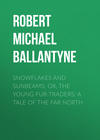Kitabı oku: «Snowflakes and Sunbeams; Or, The Young Fur-traders: A Tale of the Far North», sayfa 14
Bir şeyler ters gitti, lütfen daha sonra tekrar deneyin
Türler ve etiketler
Yaş sınırı:
0+Litres'teki yayın tarihi:
09 nisan 2019Hacim:
430 s. 1 illüstrasyonTelif hakkı:
Public Domain